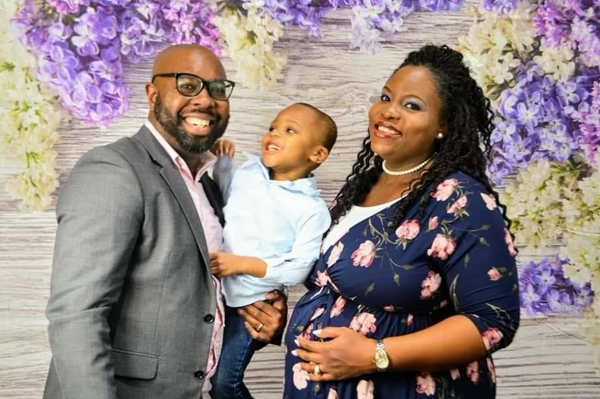Coronavirus In Chicago: How Moms Are Navigating Childbirth and Newborns During A Pandemic
CHICAGO (CBS) -- There are still a lot of questions about COVID-19, including how the virus affects pregnant women and their babies. The CDC says there's just not enough data yet to know whether it's easier for pregnant women to become ill with the disease or if they'll be impacted more than other people.
Samantha Alonis works in public health and is 19 weeks pregnant with her first child. She says that she's been concerned about the outbreak for some time now, but her anxiety has risen in the last two weeks.
"I have my 20-week ultrasound next week, and I'm a little nervous about if anyone has visited the doctor's office and has been exposed to COVID-19. So I just have to take extra precautions," she said.
The number of cases in Chicago is growing, and that's with a lack of testing kits. As the COVID-19 crisis becomes more dire, it's difficult to know how everyday life will change in the coming weeks.
"I'm struggling to enjoy the things you normally enjoy as a first-time mom. I don't know if I'll be able to have a baby shower and it makes it hard to enjoy the moment when you have to be anxious about whether you're being exposed to a virus that there's not enough data to know how it affects pregnant women and their babies yet," Alonis said.
Alonis and her husband are currently working from home, which makes it easier to minimize her exposure to other people. She's now making decisions about which appointments can be done virtually.
It's an uncertain time for many in the Chicago area, but Dr. Melissa Simon, OB-GYN, vice chair of clinical research at Northwestern Medicine, says it's important for women to know that feelings of anxiety and confusion are completely normal.
"Being pregnant and having a newborn at home after delivery can be a very heightened time of anxiety and fear. During these unprecedented times of COVID-19, it's even scarier. There can be more anxiety and more depression or confusion, and it is totally normal to feel this way. If you are feeling this way, please reach out," Dr. Simon says.
To help manage these feelings, the CDC recommends taking breaks from social media or television, eating healthy meals, getting enough sleep, making time to unwind by participating in activities you enjoy, and connecting with others.
Dr. Simon says that expecting mothers shouldn't worry about giving birth in hospitals amid the pandemic.
"It remains safe to deliver in a hospital. As a matter of fact, it's actually [the] safest option at the moment because our emergency teams; ambulances, and support staff out in the field is very limited across the country. Right now, it's really important to note that the safest place to deliver is in the hospital with the full teams available."
In Chicago, Northwestern Memorial Hospital and Prentice Women's Hospital are taking additional precautions to keep expecting mothers safe. Any pregnant women who are under investigation for COVID-19 or showing symptoms will be on a separate floor with separate staff that do not overlap with moms showing no symptoms.
Waiting to give birth during a pandemic can be anxiety inducing, but what happens after the baby is born?
Nikeya Young was pregnant with twins when she went into the hospital on March 11th. COVID-19 was still in its early stages in the U.S., but the crisis would grow significantly during her stay. Young was admitted to Silver Cross Hospital for severe preeclampsia. She said she avoided news headlines as much as possible prior to giving birth, but heard murmurs of the growing threat. Since her blood pressure was high, Young says the nurses advised her to not watch TV or read anything about COVID-19 because they didn't want her blood pressure to skyrocket.

Nikeya with her husband, Rodney Young Jr. ,and son, Rodney Young III.
"I had a lot to prepare for– you don't want to freak yourself out too much. So I tuned out news headlines. There was a lot of nervous energy. It's been a hard thing to process, you're trying to be an informed citizen but you're trying to protect your mental space and not stress yourself out," Young said.
After Nikeya gave birth to twins, Nissi and Nalea, she read everything she could about the pandemic. That's when the anxiety really hit.
"With my son, anybody could come to the hospital and visit me. With this birth, nobody could come visit me," Young said.
That's the model that many hospitals are following during this outbreak. Northwestern Medical Center in Chicago is allowing one visitor for laboring moms. Other hospitals in "hot zones," like New York City, are restricting visitors in maternity wards entirely.
Nikeya is home but her newborn twins are still in the NICU.
"I want to take my kids home. When I saw what was happening outside, all I wanted was to get home with my family and just not come out. But we have to come out every day. Because every day that my children are living at the hospital, I'm going to go visit them. So that's another level of anxiety."
The twins are doing well and are expected to be discharged soon, but when they do come back, Nikeya says they're only leaving for essential doctor's appointments.
The guidelines for pregnant women on preventing the spread of COVID-19 are the same tips given to the general public: cover your cough, wash your hands, and avoid people who are sick.






